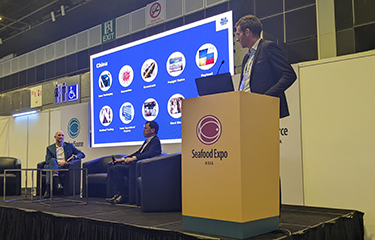The supply-chain challenges facing international air freight are multi-faceted, and likely won’t end until the COVID-19 situation in China eases, according to a panel of experts.
Speaking during the conference program at Seafood Expo Asia in Singapore, running from 14 to 16 September at the Suntec Singapore Convention and Exhibition Centre, Auslink Marine Director Anthony Chung said China’s zero-covid policy, coupled with certain policies surrounding the handling of air traffic, continue to disrupt the flow of air freight. The core problem, he said, is policies are up against a lack of enough workers thanks to China’s “7/7/7” policy.
The 7/7/7 policy dictates that a Shanghai airport worker will work for seven days, quarantine for seven days, and then have seven days off.
“For seven days working, they’ve got 14 days that they can no longer work,” Chung said.
The end result is that the amount of workers available on any given day is reduced, even as the work load increases.
“Bear in mind, the clearance process becomes much much more extensive than it was before,” Chung said.
It isn’t just the lower amount of labor causing issues. Passenger flights that also carry cargo are subject to certain restrictions based on COVID-19 testing.
“If you’ve got a passenger flight that comes into China at the moment, if 4 percent of the tested passengers get COVID, that airline route is now banned for one week. If 8 percent are tested for COVID, that air route is banned for two weeks,” Chung said.
That results in a lot of unpredictability for anyone trying to move cargo. Even if there’s a permanent booking set up for block space agreements on a passenger flight, that flight may end up being restricted from travel for weeks at a time.
“Until that situation changes, not much can be done,” Chung said.
The ongoing policy in China is continuing to impact air freight, which has faced a compounding set of delays and problems internationally. In addition to the many problems caused by the COVID-19 pandemic, the March 2021 incident with the large freighter Evergiven – which closed the Suez Canal and resulted in massive freight problems – also had ripple effects into the world of air freight, according to Blue Water Shipping General Manager Morten Würgler.
According to Würgler the delays to shipping caused some companies that were desperate to ship goods to shift to paying for air freight, even if it meant paying triple the normal rates. That in turn pulled freight routes away from other areas to the more lucrative routes, which had negative impacts on the fresh seafood industry – particularly salmon.
The latest round of chaos hitting air freight, Würgler added, stems from the Russian invasion of Ukraine.
“First people are stopping from flying over Ukraine. Right after that, sanctions toward Russia meant you have to close Russian air space, meaning you have to fly around it,” Würgler said. “You went from the shortest route to Asia, to the longest.”
Longer flight routes means planes need to carry more fuel, and with more fuel, planes can carry lower payloads. Würgler said that resulted in instances like planes out of Helsinki moving from 30 to 32 metric tons of cargo to just 18.
To top it off, the sanctions on Russia caused prices of fuel to increase. Overall, the compounding issues have led to a difficult environment for any company trying to ship fresh seafood via air freight, but Würgler said that the situation is starting to finally improve.
“It looks like now the capacity is getting back because we are in need of the passenger aircrafts,” he said. “Of course if China will open again, that will change the whole picture again because it will give us a lot more capacity.”
Photo by Chris Chase/SeafoodSource







